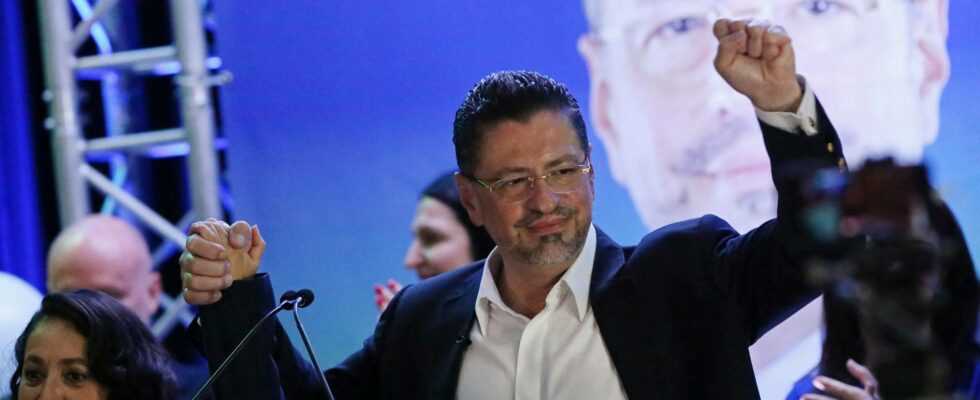Conservative candidate Rodrigo Chaves has been elected president of Costa Rica.
The conservative Rodrigo Chaves, a former executive of the World Bank, was elected Sunday president of Costa Rica for a four-year term, in one of the most stable countries in Latin America but in the grip of an economic and social crisis.
The centrist candidate José Maria Figueres recognized the victory of Mr. Chaves who won 52.9% of the vote, against 47.1% for his opponent, announced the Supreme Electoral Tribunal (TSE) after counting 89% of the ballots. vote.
Some 3.5 million voters were called to the polls in the small Central American country, long considered the most stable in Latin America. The ballot took place without major incident.
“Costa Rica has voted and the people have spoken. As democrats, we will always respect this decision (…) I congratulate Rodrigo Chaves and wish him the best,” said Mr. Figueres, the former president , in front of a crowd of supporters.
“I receive with the deepest humility this sacred decision of the Costa Rican people (…) This result is for me neither a medal nor a trophy, but an enormous responsibility”, declared for his part Mr. Chaves.
Mr. Chaves, 60, promises to provide solutions to the problems facing Costa Rica: the foreign debt, equivalent to 70% of GDP, the poverty rate of 23% of the population, unemployment at 14%, and corruption scandals in the public sector.
Sanctioned for sexual harassment of two employees
Rodrigo Chaves, an economist who walked out of the outgoing government’s finance ministry after just 180 days, had a meteoric trajectory during the election campaign.
He qualified as an outsider in the first round on February 6 at the head of the brand new Parti Progrès Social Démocratique (PPSD) and rose very quickly in the polls during the two months between the two rounds.
He thus overcame with the voters the handicap of having been sanctioned for sexual harassment of two collaborators between 2008 and 2013 while working for the World Bank.
His rival José Maria Figueres, who had already governed the country from 1994 to 1998, was also not exempt from reproach.
Without this going to trial, an investigation had been opened against the former president, suspected of having received 900,000 dollars in 2004 from the French company Alcatel to win public contracts. Exiled in Europe, Mr. Figueres refused to respond to summonses from justice and only returned to his country in 2011, once the case was barred.
“April 3 is going to be a real revolution in the history of this country. We are going to clean the house”, had launched during his last meeting Mr. Chaves, who cultivates an image of a fighter.
No majority in Parliament
However, the new president will not have a majority in Parliament and will have to deal with the other parties.
Incumbent President Carlos Alvarado could not stand for a second consecutive term, according to the terms of the Constitution.
“Our first concern is that there is work, economy and security,” said Angela Marin, 58, who voted in San Jose.
“The next president must change everything! There is no work here, there is nothing,” commented on a street in the capital Ana Briceño, a 64-year-old travel agent.
Tourism, one of the main drivers of the country’s economy, has been hit hard by the coronavirus pandemic and Costa Rica has suffered the highest rise in unemployment in the region, along with Peru.
But the country remains the “happiest” in Latin America, according to the latest World Happiness Report.
